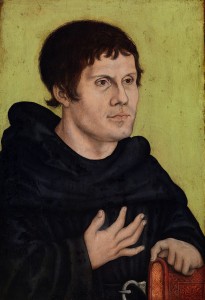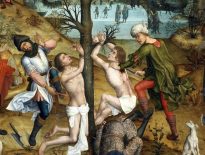 Today, 31st October 2017, is the 500th anniversary of the beginning of the Protestant Reformation. German Reformer Philipp Melancthon recorded that "Luther, burning with passion and just devoutness, posted the Ninety-Five Theses at the Castle Church in Wittenberg, Germany at All Saints Eve, October 31", and Luther sent a copy of The Ninety-Five Theses (proper title: Disputation of Martin Luther on the Power and Efficacy of Indulgences) to Albert, Archbishop of Mainz, and the Bishop of Brandenburg along with a letter protesting against the sale of indulgences.
Today, 31st October 2017, is the 500th anniversary of the beginning of the Protestant Reformation. German Reformer Philipp Melancthon recorded that "Luther, burning with passion and just devoutness, posted the Ninety-Five Theses at the Castle Church in Wittenberg, Germany at All Saints Eve, October 31", and Luther sent a copy of The Ninety-Five Theses (proper title: Disputation of Martin Luther on the Power and Efficacy of Indulgences) to Albert, Archbishop of Mainz, and the Bishop of Brandenburg along with a letter protesting against the sale of indulgences.
Martin Luther's 95 Theses had a major impact. The resulting controversy over Luther's letter and his Theses is seen as the beginning of the Reformation, the schism from the Catholic Church and the start of Protestantism.
To celebrate this anniversary, here are links to resources on the Reformation:
- Reformation Books - Our list of recommended reading on the Reformation for members.
- Tudor Life Magazine Reformation Special - October 2015's edition of Tudor Life had the Reformation as its focus.
- Expert Talk: Gareth Russell – The Importance of Christianity
- The Reformation - A History Extra podcast with Professor Eammon Duffy.
- Starkey on the Reformation - A History Extra podcast with David Starkey.
- Europe's holy war: How the Reformation convulsed a continent - An article by Diarmaid MacCulloch.
- England's bloody Reformation - Podcast with Professor Peter Marshall.
- Henry VIII's savage Reformation - An article by Professor Peter Marshall.
Today is also Halloween, or All Hallows Eve. Click here to read more about this feast day and for my video on soul cakes.



No, the 95 Thesis did not spark the Reformation. Luther only wanted a debate on the theology and abuses and to talk about ending the abuse, not start either a movement or even end indulgences. The original intention of an indulgence to help people with the Sacrament of Confession and Penance as long as they repented truly and to renew their faith, he had no problems with. He didn’t even publish them on the Church door. He wrote them and placed them in a letter and then wrote tracts on them. It was the disputations and debates which made them widely known. It was also the Diet of Worms (Vorms) and then his translation of the New Testament which transformed Luther and his theological ideas into a movement. He was thrown out of the Catholic Church, he became abusive in his writing, he fought with more violent forces and then his new Church was born at Ausberg in 1530. His many writings and evangelical zeal made Luther famous and his ideas were taken over by people such as Thomas Muntzer who saw the New Jerusalem in them. It was the tragedy of the true Protestants, in the Peasants War in 1525 which led to this man being killed and 25,000 or so others as well. Luther wrote against this new world that the ordinary people were encouraged to demand and he denounced Muntzer. These people were Protestants. Luther also hated anyone destroying the Church decorations or images. He still saw them as an aid to understand the Bible. It is good we have these special commemoration events of 500 years as it is a big historic moment! However, is not so much an event as a beginning of an evolutionary theory which turned, possibly unintentionally into a revolution. It has also to be remembered that many brutal things happened because of the Reformation and that regardless of Martin Luther, the Church underwent its own reform on a number of occasions.